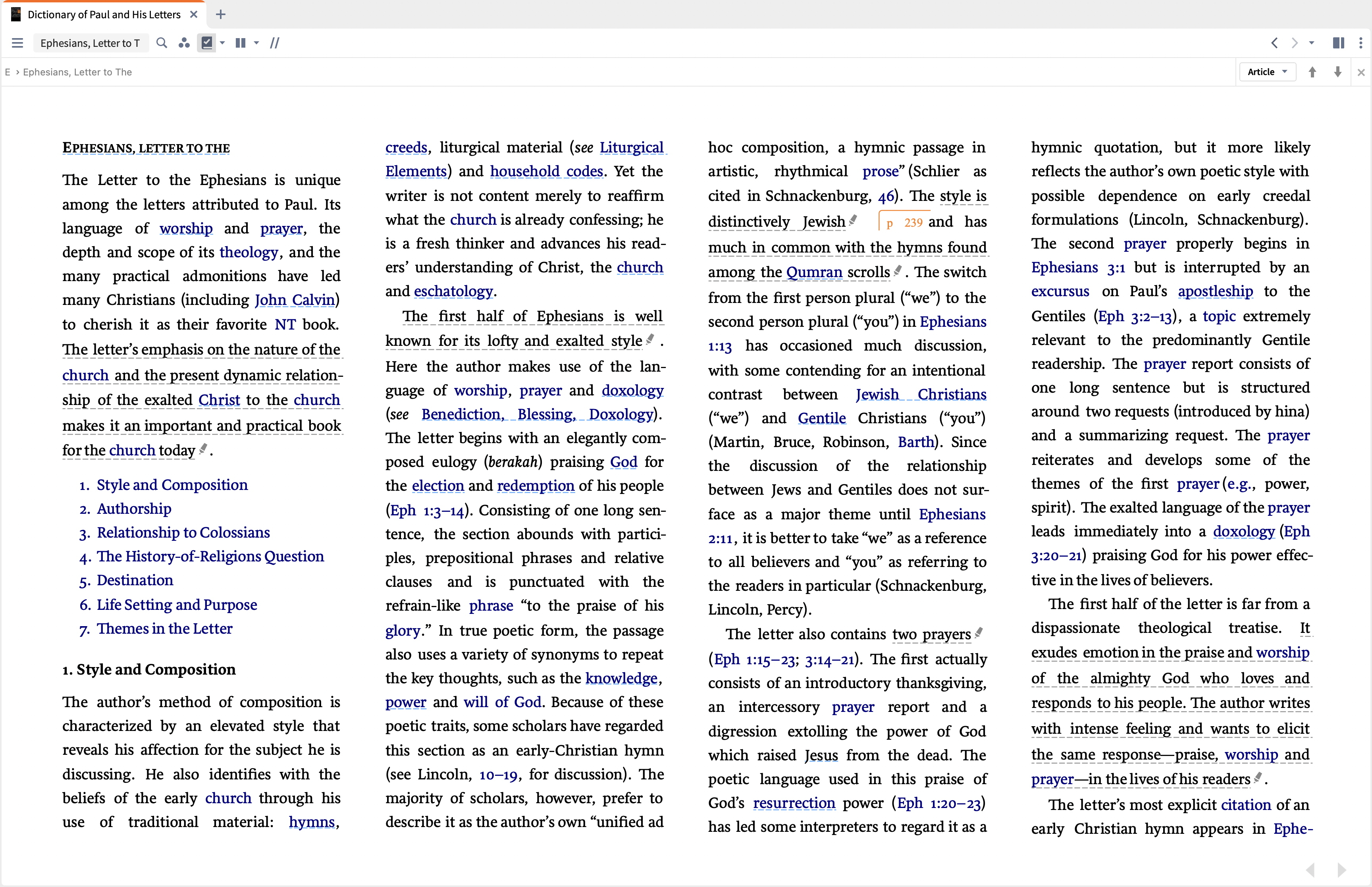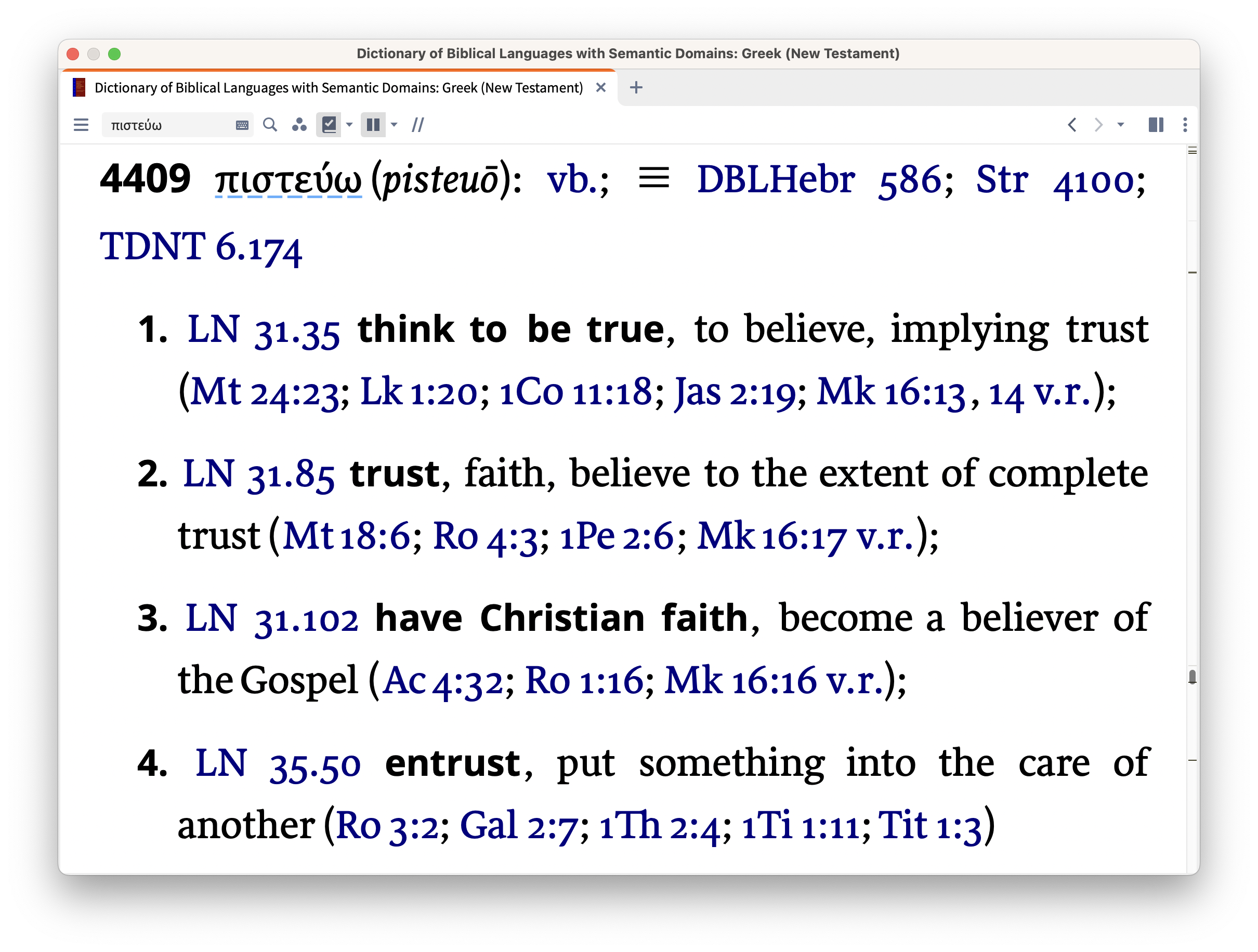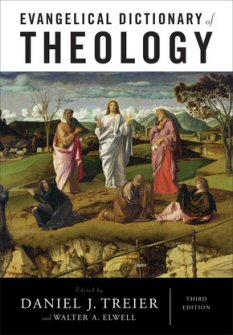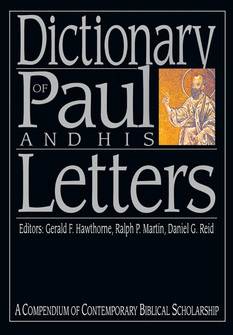I was that kid whose nose was always stuck in a book. I was also that kid who occasionally read a dictionary for fun. I just loved words—including and especially God’s Word.
When I was eleven years old, I asked for my own Bible, having already worn out the Children’s Bible on the family bookshelf. It was time to graduate to the big leagues and start reading the “real” Word of God. I recall sitting down with that new Bible and staring at it blankly. I’d been reading daily since Christmas, but it wasn’t making much sense. How should I understand the prophecies of the Old Testament? What did Jesus mean when he talked about “the kingdom of God”? Who were the Ammonites, or the Galatians, or the Pharisees?
Without a mentor to guide me, my Bible study habits teetered between ignorance and zeal. I needed help. I didn’t know it, but I needed a Bible dictionary.
What is a Bible dictionary?
While a basic English dictionary provides pronunciations and definitions of words, Bible dictionaries offer encyclopedic entries containing definitions and background information on key terms found in and related to the Bible. They identify people, biblical and cultural concepts, doctrines, animals, groups, places—even plants. Words are arranged alphabetically and cross-referenced with related words and with verses in which they appear.
Bible dictionaries offer encyclopedic entries containing definitions and background information on key terms found in and related to the Bible.
No reader can avoid the reality that opening a Bible also opens a portal into a different world. The stories within tell of people from thousands of years ago in a region thousands of miles away who had a way of life very different from ours. Yet for all the separation in time, geography, and culture, we recognize the common humanity recorded in the biblical text. We know that by reading it we will gain spiritual treasures, if only we can understand what we are reading.
Bible dictionaries offer us a window into that unfamiliar world. They act as indispensable companions to our Bible study. Learning how to use them can radically enhance our time in the Word.
Why use Bible dictionaries?
As we read the Bible and encounter unfamiliar terms, we must decide to pause and investigate. To skip over these unfamiliarities may help us read faster and perhaps meet our reading plan goals, but we will sacrifice understanding. Let’s imitate the psalmist in Psalm 119:97–99,
Oh, how I love your law!
I meditate on it all day long.
Your commands are always with me
and make me wiser than my enemies.
I have more insight than all my teachers,
for I meditate on your statutes. (NIV)
Scripture is meant to be absorbed, thought over, meditated upon, and understood—so that we might then interpret God’s meaning accurately and apply his truth to our lives. By skipping over strange places or names or neglecting to find pertinent connections, we will miss critical information and context that unlocks the meaning of a passage. Take time with a Bible dictionary to investigate the unknown.
I traveled to Italy to explore holy sites and historic ruins; what I’d read about in books I now scraped my knuckles on. I shivered in the cool air of the dimly lit catacombs and peered up the steep stairs where the open door let in a ray of sunlight. Walking through the early Christians’ burial ground revealed to me their hope of resurrection. Families expressed their faith by treating their dead with respect and honor, laying them to rest together in cubicles (shelf-like recesses in the cave walls), with biblical scenes painted overhead, until the day comes when Jesus would raise them back up again to new life.
While it’s not quite as vibrant an experience as visiting in person, a Bible dictionary offers a similar sense of context. Words previously marked by mere numbers—chapter and verse—suddenly come to life through background, explanation, meaning, and significance. If we are sleuths on the trail of a Bible mystery, we will need our dictionaries to serve as magnifying glasses that allow us a closer look at the evidence.
What’s the benefit of online Bible dictionaries?
Before the Logos Bible study app, students of the Bible would pull out their print dictionary (or multiple volumes, if they had them), flip back and forth between entries and dictionaries, and then synthesize what they learned—a time-consuming process. But electronic Bible dictionaries close that time gap, providing instant answers to your questions.
With a Bible platform like Logos, you can add favorite dictionaries to your digital bookshelf—for instance, the Eerdmans Dictionary of the Bible and the Lexham Bible Dictionary. Both of these are general resources, but in Logos you could add a specialized one like A Dictionary of Christian Biography. Link your favorite resources (not just dictionaries), and when you open a Bible in Logos, they will all open as well. When searching a word, these dictionaries offer a one-stop check for a variety of definitions, references, and connections with other concepts and passages. We might also discover visual evidence, photographs of famous places, drawings, and graphics.
A Dictionary of Christian Biography, Literature, Sects and Doctrines (4 vols.)
Regular price: $34.99
How do we use Bible dictionaries?
Bible dictionaries vary in scope. Just as we spend time in the Word for different reasons, so also will we choose different dictionaries for different kinds of insight. Let’s walk through scenarios that bring us to the Bible and consider what kind of dictionary would be most helpful.
Daily devotions
What if you are reading Scripture in your daily devotions?
General Bible dictionaries
Daily Bible reading uncovers words we don’t find in our everyday vocabulary. Most of us don’t grow up knowing when Tiberius Caesar (Luke 3:1) was emperor, or why prophets hung around in the Jerusalem temple (Luke 2:36). What’s the “Festival of Passover” (Luke 2:41)? Reading to understand can be enhanced by a general dictionary, which gives us a wide range of terms with relatively short entries describing each one—a Christmastime reading might mention Bethlehem, for instance. The Tyndale Bible Dictionary entry for “Bethlehem,” for example, begins like this:
“City of David” and the birthplace of Jesus Christ, five miles (8 kilometers) south of Jerusalem. This city is sometimes called Bethlehem-judah (KJV) or Ephrath (Gn 35:19; Mi 5:2) to distinguish it from the Bethlehem of Zebulun. As an early Canaanite settlement, it was associated with the patriarchs, for Rachel died and was buried in its vicinity (Gn 35:16, 19; 48:7).1
The “Bethlehem” entries in the Baker Encyclopedia of the Bible and the Lexham Bible Dictionary begin with similar information. Each offers slightly different details and cross-references, but the entries are very alike. The Holman Illustrated Bible Dictionary adds photographs, as the name implies. Together, these resources give a beginner Bible student the basic background of the town of Jesus’s birth and its significance throughout the Bible.
Did you realize there was a second town of Bethlehem? Who remembered, or knew, that Jacob’s beloved wife Rachel died and was buried there? Could you have found the other Bible references where Bethlehem appeared? How does knowing that Jesus was born in the city of David reinforce his identity as the Messiah?
By adding clues from across the Bible, history, and geography, dictionaries answer these questions and enlighten readers’ understanding of a given passage.
Theological dictionaries
Sometimes our studies veer from Bible to theology, a field that pulls together ideas from Scripture and synthesizes them into coherent topical discussions. What does the Bible say about Jesus? That’s called “Christology”—and Bible dictionaries will often contain an entry for that word. What can we know about prophecy and the end times? The study of “eschatology” explains every prediction down to the date Jesus returns (just kidding! A good theological dictionary will clarify that such information does not exist, per Jesus in Matt 24:36). A few recommended texts:
Dictionary of Theological Terms: Alan Cairns provides students with accessible discussions of over five hundred pages of theological terms. Each entry introduces the meaning of the term, its importance, and ways it has been understood in both historical and contemporary theology.
Evangelical Dictionary of Theology: Now in its third edition, this resource has proven to be readable and reliable. It features articles relevant to world Christianity as well as freshened articles on enduring theological subjects, providing comprehensive A–Z coverage for today’s theology students. The new authors reflect the increasing diversity of evangelical scholars.
The Logos platform offers dozens of basic reference books for beginning and intermediate students of the Bible. When accessed through Logos, we gain the ability to view several at once, to coordinate the resource with the Bible text we’re reading, and to save time and energy in our study process.
Illustrated Bible dictionaries
Would pictures help you study better? When the Bible weaves a narrative in a land far away happening in a time long ago in places we’ve never seen, we struggle to imagine what it must have looked like. The illustrated Bible dictionaries include photos and drawings, many of which show ancient places as they are today.
The Holman Illustrated Bible Dictionary, a modern classic, features hundreds of color photos and maps, a pronunciation guide, archaeological excavation findings, timelines, extensive cross-referencing, unique scale drawings, major articles on theological topics and, of course, exhaustive definitions of people, places, things, and events. This dictionary was designed to serve a broad audience, from laypeople, students, and ministers to professors and scholars.
The 2011 Zondervan Illustrated Bible Dictionary includes over 7,200 entries—articles, sidebars, charts, 75 full-color maps, 500 full-color images, and a Scripture index. In book form, it is a gorgeous reference item. In Logos, the images are fully connectable to the Bible passages we study.
For instance, if we open to Mark 8, Jesus and his disciples are in the area of Caesarea Philippi, on the northwest coast of Palestine at the Mediterranean Sea. Somewhere in that area, Peter makes his famous declaration that Jesus is the Messiah (8:29). Then Jesus takes Peter, James, and John up a mountain where he is transfigured (9:2). So Caesarea Philippi became a significant place for early Christians. Photos of the landscape, some ruins, and the ocean help us see the land that played an important role in our faith’s history.
Teaching, preaching, or writing curriculum for a Bible study?
When we move from absorbing information to conveying it to others, our research will need to bump up a level. The general dictionaries can be helpful, but more comprehensive ones will help us make connections between passages and will educate us about historical and cultural backgrounds.
Consider a resource such as the IVP Bible Dictionary Series. This eight-volume set recently added an updated version to its “Paul & His Letters” (hereafter DPL1, DPL2) edition. Thus, with nine volumes, separated into books with titles like Paul and His Letters or Old Testament Prophets, the IVP series brings deep background and analysis to each entry. They resemble encyclopedias more than traditional dictionaries. With entries written by a long list of qualified contributors, we can be confident that the series features male and female scholars from a wide variety of theological, ethnic, and personal backgrounds.
Dictionary of the Old Testament Prophets (The IVP Bible Dictionaries)
Regular price: $39.99
Let’s say we are working on a study of Paul’s letter to the Ephesians. After reading the biblical text, turn to DPL2’s entries “Ephesians, Letter to the” and “Ephesus.” In those multi-page essays, we find historical background on the city, the people, their religious expressions, Paul’s ministry and conflict with them, as well as the arguments and purpose of his letter to them. The entry devoted to the letter outlines its major themes, discusses theories surrounding its authorship (did Paul actually write it?), and theological implications.

Each entry contains more information than one student typically needs, but they are well organized, with clear subtitles and a list of cross-references at the end. When we are ready to study Ephesians 5, the marriage/family passage, DPL2 provides cultural background to Paul’s exhortations to husbands, wives, slaves, and children in Ephesians 5:21–6:9. Elsewhere in DPL2, we find an entry devoted solely to “Households and Household Codes,” which offers an expanded explanation of the Roman household and its role in ancient society.
It’s important for today’s students to know about Paul’s context, what families looked like in the first century when he wrote, and the meaning of critical words he used. Such background information helps us interpret more accurately and avoid reading our own culture into that of the Bible. Households in America, we know, do not work the same way they did in first-century Rome
Studying in Bible college or seminary?
Students at the university and graduate levels will be engaging with the biblical text on a deep level. They will need weighty reference material. Before Logos, those books fit that description literally and metaphorically: they were difficult to understand and a burden to carry. One of the beauties of online libraries is the ease with which such massive books can be accessed from anywhere.
Dictionaries focused on Greek and Hebrew words are typically called “lexicons.” A working knowledge of the two alphabets is necessary to use them, and if your project requires word studies, you’ll absolutely need a lexicon. They list, in alphabetical order, the major words used in the New and Old Testaments. Each word includes multiple ways in which it was used.
Perhaps we are studying the theology of salvation and want to explore the idea of faith. What does it mean to have faith? The Greek word for faith is pisteuō, so we check out the entry in the Dictionary of Biblical Languages (DBL)2:

In the first line that introduces the word being defined, note the last referent, “TDNT 6.174.” More information can be found there if we wish to dive deeper. In Logos, we have only to click that hyperlink and we’ll be brought to the next invaluable resource every seminary student needs.
The Theological Dictionary of the New Testament (TDNT) and the Theological Dictionary of the Old Testament (TDOT) list virtually every Greek and Hebrew word in Scripture, define it, cross-reference it to verses where the word appears, offer articles expounding upon the intricacies of interpretation, and generally leave a student feeling either overwhelmed with information or competent to handle the scriptural passage in question. These two dictionaries comprise almost two hundred years of scholarly work that has been organized, translated into modern English, and now digitized for easy access.
These were originally very large, expensive, multi-volume resources; they’ve also been condensed into more accessible (and affordable) one-volume editions. Within Logos, however, size is not an issue—the full capacity of these massive resources sits at our fingertips, waiting for a hyperlinked prompt, as in the example above, to open an article that will enlighten the Bible student’s mind.
A Dictionary of Biblical Languages with Semantic Domains: Greek (NT)
Regular price: $23.99
Questions to consider
Are paper books still valuable?
I realize you’re reading this on the Logos blog, but not everyone who finds our blog enjoys our latest online library packages. If you have a Bible dictionary on your shelf, keep it close as you open your Bible to study. Logos may be more convenient, but don’t discount the big hardback if it’s all you have. Take a few minutes to learn its structure and organization so you can flip it open ready to serve your study needs.
Do classics rule?
Likewise, check the publication date of whichever dictionaries you already own. It’s not true that older is better and newer is suspect. In fact, anything twenty years or older may be ready for reevaluation. While definitions stay mostly the same, of course, some will change due to new archaeological discoveries and linguistic theories. Inscriptions remain a source of new discovery as ruins from biblical places continue to be uncovered. Over time, new information will work its way into the reference material.
Yet, not to be contrary, there’s something to be said for reading the old works our predecessors labored over. It can be helpful to see the progression of understanding, and of language, through the centuries. Theology is best done in community, anyway, lest we think our latest and greatest thoughts are always superior.
Updated versions?
When the IVP Dictionary Series unveiled DPL2 over twenty years after DPL1 was released, some wondered if they should discard DPL1 or just keep both. The publisher and editors recommended keeping both, for the scholars writing the articles in the new edition are almost all different from those who wrote the first. A small percentage of the original dictionary remains in DPL2, but the rest are fresh articles and research written by current and active scholars in the field.
Any first and second editions of a resource are worth comparing. DPL1’s entry for the Letter to the Ephesians does not even have a section on the household codes. DPL2’s Ephesians expert, Dr. Lynn Cohick, applied her deep knowledge of first-century Roman culture to the words of Paul to show us the roots of a passage (Ephesians 5) that would have been controversial to Paul’s original audience in a completely different way than it is to today’s readers.
Conclusion
From the first weeks of reading my Bible, through seminary, teaching, and to the last academic paper I wrote, I have relied on Bible dictionaries of varying complexity to supplement my study of Scripture. Since the advent of Logos, using online Bible dictionaries has become one of the easiest ways to begin uncovering background and contextual information about biblical people, places, and events.
I suggest that you invest in one or two Bible dictionaries, that you explore other Logos library tools, and that you build a knowledge base that will increase your understanding of Scripture and, ultimately, build your faith.
Related articles
- Online Bible Dictionaries: Why Everyone Needs at Least One
- How to Study the Bible: 9 Tips
- The Bible: The World’s Most Important Book
- The Definitive Guide to Bible Commentaries: Types, Perspectives, and Use
- 29 Bible Study Tools for Reading the Bible More Effectively
- 8 Reasons Bible Dictionaries Are the Unsung Heroes of Bible Study
- Walter A. Elwell and Philip Wesley Comfort, Tyndale Bible Dictionary (Wheaton, IL: Tyndale House Publishers, 2001), 165.
- James Swanson, Dictionary of Biblical Languages with Semantic Domains: Greek (New Testament) (Oak Harbor: Logos Research Systems, Inc., 1997).









